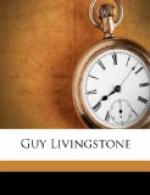“It’s very nice of him to say ‘our horses,’” interrupted Forrester. “Mine consist of one young one, that has been over about eight fences in his life, and a mare, that I call the Wandering Jewess, for I don’t think she will ever die, and I am sure she will never rest till she does: what with being park-hack in the summer and cover-hack in the winter, with a by-day now and then when the country’s light, she’s the best instance of perpetual motion I know. Well, it’s not my fault the chief won’t let us hunt our second chargers—that’s the charm of being in a crack regiment—I always have one lame at least, and no one will sell me hunters on tick.”
“Don’t be so plaintive, Charley; you’ve nearly all mine to ride: it’s a treat to them, poor things, to feel your light weight and hand, after carrying my enormous carcass. That’s settled, then, Frank; you come with us?” Guy said.
“I shall be very glad. I only want a day to get my traps together.” So two days afterward we three came down to Kerton Manor. It was not my first visit to Livingstone’s home, but I have not described it before.
Fancy a very large, low house, built in two quadrangles—the offices and stables forming the smaller one farthermost from the main entrance—of the light gray stone common in Northamptonshire, darkened at the angles and buttresses into purple, and green, and bistre by the storms of three hundred years; on the south side, smooth turf, with islands in it of bright flower-beds, sloped down to a broad, slow stream, where grave, stately swans were always sailing to and fro, and moor-hens diving among the rushes; on the other sides, a park, extensive, but somewhat rough-looking, stretched away, and, all round, lines of tall avenue radiated—the bones of a dead giant’s skeleton—for Kerton once stood in the centre of a royal forest.
You entered into a wide, low hall, the oak ceiling resting on broad square pillars of the same dark wood; all round hung countless memorials of chase and war, for the Livingstones had been hunters and soldiers beyond the memory of man.
Often, passing through of a winter’s evening, I have stopped to watch the fitful effects of the great logs burning on the andirons, as their light died away, deadened among brown bear-skins and shadowy antlers, or played, redly reflected, on the mail-shirt and corslet of Crusader or Cavalier.
There were many portraits too; one, the most remarkable, fronted you as you came through the great doorway, the likeness of a very handsome man in the uniform of a Light Dragoon; under this hung a cavalry sword, and a brass helmet shaded with black horse-hair. The portrait and sword were those of Guy’s father; the helmet belonged to the Cuirassier who slew him.
It was in a skirmish with part of Kellermann’s brigade, near the end of the Peninsular war; Colonel Livingstone was engaged with an adversary in his front, when a trooper, delivering point from behind, ran him through the body. He had got his death-wound, and knew it; but he came of a race that ever died hard and dangerously; he only ground his teeth, and, turning short in his saddle, cut the last assailant down. Look at the helmet, with the clean, even gap in it, cloven down to the cheek-strap—the stout old Laird of Colonsay struck no fairer blow.




